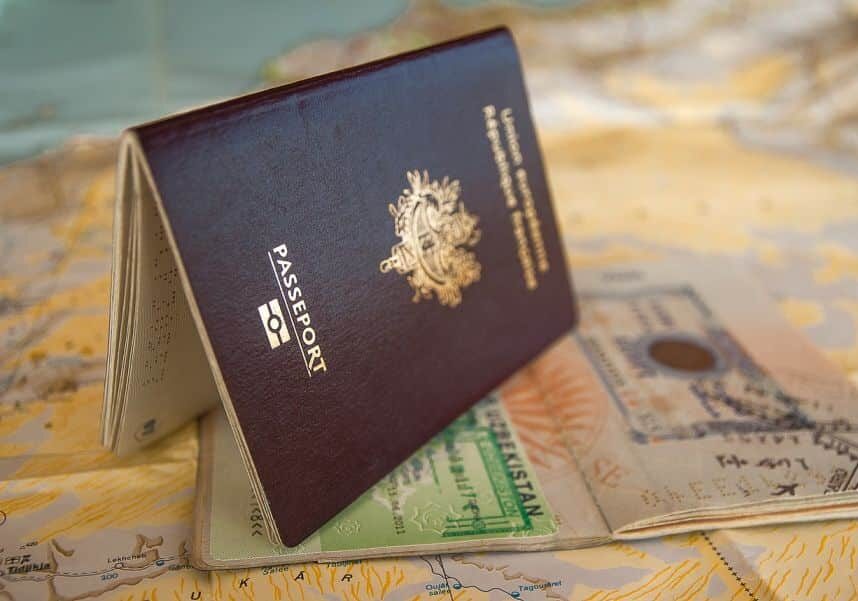Citizenship by investment programs have emerged as a fast-track solution for individuals and families seeking enhanced global mobility, financial resilience, and a secure Plan B. By making a qualifying financial contribution, whether through real estate investment, a donation to a government fund, or business ventures, applicants can legally obtain a second passport in just a few months.
In this citizenship by investment guide for 2025, we explore the top citizenship by investment countries offering legitimate paths to dual citizenship. From Caribbean nations to European and Asian options, these are the countries where you can acquire citizenship through structured, government-backed programs.
We highlight the investment amounts and investment types, benefits, and visa-free access each country provides to help you choose the best citizenship by investment program for your lifestyle, business goals, and family needs.
8 Benefits of Citizenship by Investment

1. Backup plan: A second citizenship provides security in case of political or economic instability in your home country. It guarantees you always have another place to live and work.
2. Global mobility: Owners of a second passport can travel easily to several countries without needing a visa. This is especially useful for business and personal trips.
3. Diversification of your investment portfolio: Investing in another country reduces financial risk by spreading assets across different markets. It can also open up new business opportunities.
4. Wealth protection and considerable tax benefits: Some countries offer lower taxes on income, inheritance, and capital gains. This helps protect and grow your wealth legally.
5. Security in the form of a second passport or dual citizenship: A second passport gives you more options for living, working, and studying abroad. It also ensures you have a safe exit if needed.
6. Improved quality of life: Enjoy better healthcare, education, and lifestyle options for you and your family. Some countries offer better social and economic stability.
7. Political rights: Some CBI programs allow you to vote and participate in your new country’s political system. This can give you a say in important decisions.
8. Property ownership: Many programs let you buy real estate, giving you a home or investment in a stable market.
Top 14 Countries with Citizenship by Investment Programs
The countries with the best citizenship by investment program for you depends on your unique needs and priorities.
If you’re looking for affordability, Dominica and St. Lucia are your best options. St. Lucia is also great if you like variety because it offers many investment options, including government bonds and property. Antigua and Barbuda’s CBI program is known for being the most family-friendly while St. Kitts and Nevis’ option offers stability because it’s so well-established.
Here’s a closer look at some top contenders worldwide:
Caribbean
 1. Antigua and Barbuda
1. Antigua and Barbuda
- Real estate route available? Yes
- Minimum real estate investment: US$300,000
The Antigua and Barbuda citizenship by investment program is one of the most popular among the Caribbean countries, due to it being the most cost-effective route to a second passport for investors. Applicants can include family members and visa-free travel access includes sought-after places like the Schengen Area and the UK.
Minimum Investment | Investment Options | Time to Citizenship | Visa-Free Access |
$230,000 | ● Non-refundable contribution ● Real estate investment ● Contribution to University of West Indies Fund ● Business investment | 6 months | 151 countries |
 2. Dominica
2. Dominica
- Real estate route available? Yes
- Minimum real estate investment: US$200,000
Dominica’s citizenship by investment program is known for its affordability and has one of the fastest pathways to obtaining second citizenship among Caribbean countries. Dominica permits dual citizenship without disclosure to the applicant’s home country.
Minimum Investment | Investment Options | Time to Citizenship | Visa-Free Access |
$200,000 | ● Non-refundable contribution ● Real estate investment | 6 - 9 months | 135 countries |
 3. Grenada
3. Grenada
- Real estate route available? Yes
- Minimum real estate investment: US$270,000
While the Caribbean hosts multiple CBI programs, Grenada’s citizenship by investment program is not only attractive for its low investment requirements, but also for its access to obtaining the US E2 Investor Visa, visa-free travel access 100+ countries, including China and the Schengen Area, and growing tourism industry.
Minimum Investment | Investment Options | Time to Citizenship | Visa-Free Access |
$235,000 | ● Non-refundable contribution ● Real estate investment | 6 - 9 months | 148 countries |
 4. St Kitts and Nevis
4. St Kitts and Nevis
- Real estate route available? Yes
- Minimum real estate investment: US$400,000
With the longest-running CBI scheme and visa-free travel to the most countries, St Kitts and Nevis citizenship by investment facilitates seamless travel abroad for foreign investors who qualify for its program. It offers a fast-track option for citizenship approval in as little as 60 days. The St. Kitts passport can be passed down to future generations by descent.
Minimum Investment | Investment Options | Time to Citizenship | Visa-Free Access |
$250,000 | ● Non-refundable contribution ● Real estate investment ● Investment in Public Benefit Projects | 4 - 6 months | 154 countries |
 5. St Lucia
5. St Lucia
- Real estate route available? Yes
- Minimum real estate investment: US$300,000
St Lucia’s citizenship by investment program offers access to a stable Eastern Caribbean island with low crime rates. The country is ideal for foreign investors due to its developed infrastructure, global connectivity, diverse real estate benefits, and access to abundant natural resources.
Minimum Investment | Investment Options | Time to Citizenship | Visa-Free Access |
$240,000 | ● Non-refundable contribution ● Real estate investment ● Enterprise investment ● Purchasing government bonds | 10 - 12 months | 148 countries |
Europe
 6. Austria
6. Austria
- Real estate route available? No
- Minimum real estate investment: n/a
Austria’s citizenship by investment program isn’t a traditional Citizenship by Investment program it is only granted at the government’s discretion and often requires multi-million Euro investments or job creation. The high bar it sets offers investors the advantage of EU citizenship and a permanent tie to one of the world’s most politically stable and prosperous countries.
Minimum Investment | Investment Options | Time to Citizenship | Visa-Free Access |
€2 million (case-by-case basis) | ● Non-refundable contribution | 24 to 36 months | 174 countries |
 7. Malta
7. Malta
- Real estate route available? Yes
- Minimum real estate investment: €350,000
Citizenship by Investment in the European Union is made possible through Malta’s citizenship by investment program, which provides third-country nationals with an EU passport. It is known for being one of the most powerful and prestigious citizenships available.
Minimum Investment | Investment Options | Time to Citizenship | Visa-Free Access |
€690,000 | ● Non-refundable contribution ● Real estate investment ● Philanthropic donation | 12 to 36 months | 188 countries |
 8. North Macedonia
8. North Macedonia
- Real estate route available? No
- Minimum real estate investment: n/a
North Macedonia’s CBI program provides a gateway to a country with a strategic location and potential economic opportunities in the heart of the Balkans. This nation’s government has a proactive approach in creating a business-friendly environment, including tax exemptions and incentives.
Minimum Investment | Investment Options | Time to Citizenship | Visa-Free Access |
€200,000 | ● Non-refundable contribution | 2 - 5 months | 134 countries |
Middle East and North Africa (MENA)
 9. Egypt
9. Egypt
- Real estate route available? Yes
- Minimum real estate investment: US$300,000
Providing Africa’s only CBI program, the Egyptian citizenship by investment program has a natural appeal. The country offers a fantastic real estate investment program with the bonus of receiving citizenship in return. Citizenship approval is relatively quick, and Egyptian citizenship provides strategic benefits for business in the Middle East and Africa.
Minimum Investment | Investment Options | Time to Citizenship | Visa-Free Access |
$250,000 | ● Non-refundable contribution ● Real estate investment ● Bank deposit | 6 - 9 months | 82 countries |
 10. Jordan
10. Jordan
- Real estate route available? Yes
- Minimum real estate investment: US$750,000
In a region not known for readily granting citizenship in exchange for foreign investment, Jordan’s citizenship by investment sets itself apart by allowing individuals to obtain citizenship in a historically significant country through business and real estate investment. It offers a gateway for doing business in the Middle East.
Minimum Investment | Investment Options | Time to Citizenship | Visa-Free Access |
$750,000 | ● Non-refundable contribution ● Real estate investment | 3 - 6 months | 81 countries |
 11. Turkey
11. Turkey
- Real estate route available? Yes
- Minimum real estate investment: US $400,000
This country is a strategic bridge between Europe and Asia, which provides several financial advantages on its own, and with five investment options, Turkey’s Citizenship by Investment program is an inclusive option and accommodates a diverse range of investor preferences.
Minimum Investment | Investment Options | Time to Citizenship | Visa-Free Access |
$400,000 | ● Non-refundable contribution to the National Economic Fund ● Real estate ● Government bonds ● Approved enterprise projects | 3 - 6 months | 120+ countries |
Asia
 12. Cambodia
12. Cambodia
- Real estate route available? No
- Minimum real estate investment: n/a
While Cambodia’s citizenship by investment isn’t prevalent among CBI countries, the program is accessible. The country’s low cost of living and the additional right to own land make gaining citizenship in Cambodia attractive. Cambodian citizenship provides visa-free travel access to ASEAN countries and select parts of Asia but has limited global travel reach compared to Caribbean programs.
Minimum Investment | Investment Options | Time to Citizenship | Visa-Free Access |
$245,000 | ● Non-refundable contribution to Royal Government of Cambodia ● Business investment | 3 - 6 months | 52 countries |
Oceania
 13. Nauru
13. Nauru
- Real estate route available? No
- Minimum real estate investment: n/a
This island nation launched the Nauru Citizenship by Investment program under the Economic and Climate Resilience Citizenship Act. This program is designed to attract international investors to support sustainable development and climate resilience initiatives. It can also be an appealing option for those seeking anonymity in a peaceful, growing Pacific Island nation.
Minimum Investment | Investment Options | Time to Citizenship | Visa-Free Access |
$105,000 | ● Non-refundable contribution to the Nauru Treasury Fund | 3 - 4 months | 89 countries |
 14. Vanuatu
14. Vanuatu
- Real estate route available? Yes
- Minimum real estate investment: US$200,000
Getting dual citizenship in as little as one to two months might appear improbable. However, this quick processing time is possible if you make a direct investment as part of Vanuatu’s citizenship by investment program. Please note that recently visa-free access to the EU has been revoked for Vanuatu.
Minimum Investment | Investment Options | Time to Citizenship | Visa-Free Access |
$130,000 | ● Bank deposit ● Real estate investment ● Capital Investment | 2 - 3 months | 95 countries |
Types of Investment Options for Citizenship by Investment
The types of investment required to obtain second citizenship vary by country, but most citizenship by investment programs offer one or more of the following routes:
Real estate investment
A real estate investment involves purchasing residential or commercial property in the host country. This is one of the most popular options, as it allows investors to gain citizenship while potentially earning rental income or capital appreciation.
Most citizenship by real estate investment programs require a direct purchase of government-approved properties, with exceptions like Turkey and Egypt, which allow more flexibility in property selection.
Non-refundable contribution to government funds
This option involves making a one-time financial contribution to a national development fund or similar entity. It’s typically the most affordable route and is commonly used in Caribbean citizenship by investment countries like Dominica and St. Lucia.
Your donation helps support national infrastructure, education, or public services and does not offer a financial return, hence the term “non-refundable.”
Business investment
Some countries allow applicants to gain citizenship by investing in a local business or establishing a new enterprise. To qualify, you typically must:
- Meet the minimum investment threshold
- Create a set number of local jobs
- Maintain the business for a defined period
This route appeals to entrepreneurs and investors looking to expand into new markets through economic citizenship.
Bank deposit
In select countries, a bank deposit in a national or approved financial institution qualifies for citizenship. The deposit is refundable after a fixed holding period but usually offers no interest or financial return.
Due to the low-risk nature of this option, the required deposit amount is often higher than other pathways.
Government bond investment
Similar to a bank deposit, this route involves purchasing government-backed securities for a defined term. The principal is returned after maturity, but no interest is paid.
This low-risk investment is backed by the state and is typically available in countries with established financial infrastructure.
For example, countries like St Lucia and Turkey provide official outlines of their government bond investment routes on their respective government portals and in documentation submitted to the OECD.
Factors to Consider When Choosing a CBI Program
1. Investment options and costs
- Types of investment: What would you prefer to invest in? Is it real estate, a government fund, or business ventures? Take into account whether you’d like a return on investment.
- Investment amount: Determine your financial capacity and choose a program that suits your budget.
- Total cost, including dependents: Some programs may charge additional fees for family members, so factor that into your budget.
2. Processing time and application requirements:
- Speed of application: If you need a quick turnaround, research programs with faster processing times.
- Residency requirements: Some programs require a minimum physical presence in the country, while others don’t.
- Due diligence: All programs require thorough background checks but the difference is whether they involve travel to the country for interviews as some can be done remotely.
3. Benefits and future outcomes:
- Visa-free travel: Evaluate the passport’s strength and the number of countries you can enter without a visa.
- Tax benefits: Understand the tax implications of citizenship in the chosen country.
- Global mobility: Consider the benefits of being able to live, work, and travel more easily.
- Education and healthcare: If you have children, assess the quality of education and healthcare systems in the country.
- Business opportunities: Explore whether the country offers a business-friendly environment and access to international markets.
4. Family considerations:
- Family inclusion: Ensure the program allows you to include dependents in your application.
- Family-friendly features: Some programs offer additional benefits for families, such as easier visa acquisition for dependents.
5. Country stability and reputation:
- Economic and political stability: Assess the country’s overall stability and its potential for future growth.
- Reputation: Consider the country’s reputation on the global stage, as this can influence its diplomatic relations and passport strength.
For a comprehensive overview of global residency and citizenship by investment programs, watch our webinar on the Global RCBI Report:
How Can Global Citizen Solutions Help You?
Global Citizen Solutions is a boutique migration consultancy firm with years of experience delivering bespoke residence and citizenship by investment solutions for international families. With offices worldwide and an experienced, hands-on team, we have helped hundreds of clients worldwide acquire citizenship, residence visas, or homes while diversifying their portfolios with robust investments.
We guide you from start to finish, taking you beyond your citizenship or residency by investment application.

Frequently Asked Questions about Citizenship by Investment Programs
What is Citizenship by Investment?
Citizenship by Investment is a legal process that enables individuals and in some cases their immediate family members to become citizens of a country by investing financially in the economy.
Which countries offer Citizenship by Investment programs?
The following countries offer some form of Citizenship by Investment programs: Malta, Portugal, Austria, North Macedonia, Turkey, Antigua and Barbuda, Dominica, Grenada, St. Kitts and Nevis, St. Lucia, Canada, US, Vanuatu, Egypt and Jordan.
What are the risks of Citizenship by Investment?
Citizenship by Investment carries risks such as legal uncertainties, potential revocation, and increased scrutiny from financial institutions. Some programs may face diplomatic issues, affecting visa-free travel. Due diligence is crucial before applying.
Which countries offer real estate purchase as an option for their Citizenship by Investment program?
The following countries offer real estate purchase as an option for their Citizenship by Investment programs:
- Antigua and Barbuda
- Dominica
- Grenada
- St. Kitts and Nevis
- St. Lucia
- Malta
- Turkey
- Jordan
Which country offers the fastest Citizenship by Investment?
Vanuatu is the fastest country to grant citizenship by investment. Successful individuals can obtain a Vanuatu passport in as little as 60 days by contributing $130,000 to the country’s national development fund.
What is the cheapest Citizenship by Investment program?
Dominica is the cheapest CBI program, with a minimum investment of only $200,000.
Which Caribbean countries offer Citizenship by Investment?
Antigua and Barbuda, Dominica, St Kitts and Nevis, Grenada and St Lucia are the five Caribbean countries that currently offer Citizenship by Investment.
Out of these five, the St Kitts and Nevis passport ranks the highest on the Global Passport Index.
What are the European countries that offer Citizenship by Investment?
The following European countries offer economic citizenship:
- Austria
- Turkey
- Latvia
- Switzerland
- Moldova
- Malta
- North Macedonia
With these you can get either EU citizenship or Schengen membership.
Are there any tax implications for obtaining Citizenship by Investment?
Immigrant investor programs offering citizenship can have significant tax implications. These include double taxation or the existence of taxes that may not be imposed in your original tax jurisdiction, such as capital gains and inheritance tax.
Can you buy a passport to get citizenship?
You can’t buy a passport to acquire citizenship. But you can get a foreign passport through Citizenship by Investment schemes that often require a significant financial contribution.
Do I need to renounce my previous citizenship after getting citizenship by investment?
Not necessarily. It depends on the laws of your current country of citizenship and the new country offering citizenship.
Can I transfer my citizenship by investment to my children?
Yes, Citizenship by Investment programs often allow you to include your spouse and children in the application, but each program has its own specific requirements and limitations.
Can I finance or take a loan for my citizenship by investment?
No. Most citizenship by investment countries require applicants to use legally earned and fully liquid funds. Borrowed money, including bank loans or financing from third parties, is typically not accepted due to strict source-of-funds rules.
Is citizenship by investment the same as permanent residency?
No. Citizenship by investment (CBI) provides full citizenship rights, including a passport, while residency by investment (RBI), also called a Golden Visa, offers legal residence without citizenship. RBI can sometimes lead to naturalization, but not always.

 Citizenship by Investment (CBI) is a process of acquiring citizenship in a country by making significant financial contributions, typically through investing in real estate, government bonds, or a national development fund.
Citizenship by Investment (CBI) is a process of acquiring citizenship in a country by making significant financial contributions, typically through investing in real estate, government bonds, or a national development fund.
